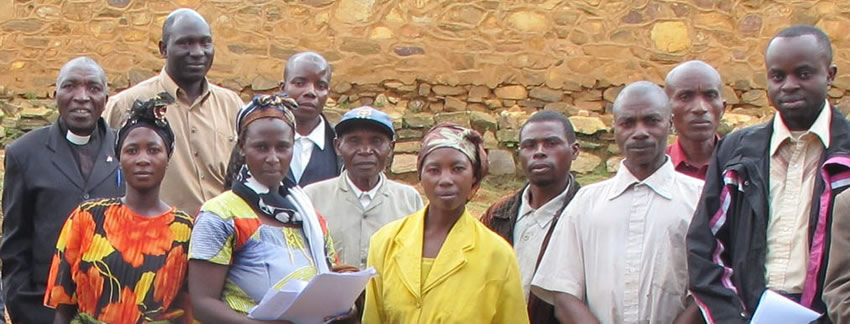
|
|
|
| Home » |
The Nehemiah Initiative Strengthen CommunitiesThe Nehemiah Initiative facilitates training and support for local community leaders to reflect on their own situation and resources in the light of the old testament story of Nehemiah. This story, of Nehemiah returning to rebuild his city after it had been destroyed in war, is common to all the faith groups where HEAL Africa works: Catholics, Protestants, Kimbanguists, and Muslims. Local leaders choose activists who are trained in mediation and community mobilization to define ways to help the most vulnerable within their village: the handicapped, widows, orphans, and victims of sexual violence. Nehemiah Committee BeginningsAs HEAL Africa began to treat more patients from rural areas, it became evident that to send “mended” people back to the same situations was simply not safe, especially for the survivors of sexual violence, orphans, and widows. Augmented by the insecurity and resulting economic instability of their home villages, their vulnerability greatly disturbed the HEAL Africa staff. 
HEAL Africa began to work with community and religious leaders to create a support structure for the most vulnerable populations in their communities. The goal of this work is to sensitize and mobilize community leaders to care for the vulnerable in their midst by supporting foster family programs, reintegration of widows and victims of sexual violence (many who have HIV/AIDS), and stimulating economic recovery through agriculture and small animal husbandry. These initiatives took the name of “Nehemiah Committees”. In 2004, the first three committees were established, today there are more than 65 throughout rural villages in the surrounding region of Goma. Program ResultsWithin the first twelve months of beginning the program, 70 orphans were placed in foster homes and over 43 houses were built by the Nehemiah committee for returning widows. The program continues to flourish and expand. Gender and JusticeHEAL Africa’s Gender and Justice program seeks to tackle the root causes of gender inequality in the Congolese society. Through decades of war and centuries of exploitation, traditional social and community structures have been broken down to the point where the majority of the population of Congo does not even know that they have rights, as shown in a study by HEAL Africa in Maniema province. The first premise of Gender and Justice is that the law must express the collective will of the community, and be reinforced by the judicial system to punish lawbreakers. The second premise is that the rights given to women in the 2006 Law on Sexual Violence and the 2005 Constitution must be actively appropriated by women within a community that supports their empowerment. HEAL Africa’s approaches gender and justice issues through four facets:First, HEAL Africa partners with the American Bar Association to reinforce the judicial system at the provincial, territorial, and community levels so that victims of sexual violence obtain justice, and a clear message is given to the community that sexual violence in any form will not be tolerated. Second, HEAL Africa works with religious ministers and community leaders for community mobilization. We believe that all human beings have the strength and capacity to transform their society. We equip religious ministers and community leaders, through gender and justice trainings to be advocates for change by promoting gender equity. Third, a new approach was designed by HEAL Africa that will specifically address masculinity issues. Men are the target group. Through this strategy we intend to transform the dominant and oppressive masculinity into a collaborative masculinity. Currently the way cultures, religions, and schools socialize boys to become men inherently lends itself to oppressive attitudes towards women. Fourth, HEAL Africa works closely with primary and secondary schools in the North Kivu and Maniema provinces to conduct gender and justice activities. It is well known that the formal education delivered at school plays a major role in the process of growth of children. We train teachers and create youth clubs at schools that allow young boys and girls to discuss gender-related issues. Overall, HEAL Africa approaches gender issues with utmost care to inclusion and mutual understanding. Gains in gender equity and a functioning judicial system will only take place if the whole community is actively involved as a stakeholder. Mawe Hai (Living Stones) Community NutritionLiving Stones ("Mawe Hai" in Swahili) is a special agricultural branch of HEAL Africa. This innovative program for food security introduces new techniques and seeds to improve food production for consumption and for profit. Increased production and profits enable local Nehemiah Committees to care for vulnerable populations in the community. Through its seed multiplication center, Living Stones also promotes medicinal plants (such as artemesia, neem, aloe, and cassia) and reforestation. What Difference has it Made?
|
|
Our Mission Providing holistic care including physical, spiritual and social healing for the people of the Democratic Republic of Congo; training for health professionals; support to strengthen communities; encouragement for women in community leadership roles; and support for education and vocational training. Copyright © 2011 HEAL Africa is a registered 501(c)(3) charity | EIN#20-4104936 All Rights Reserved. |
